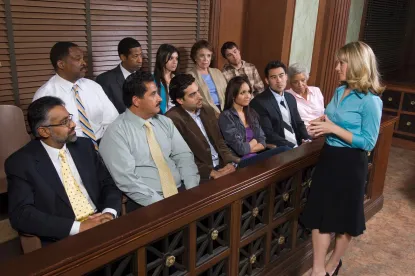Jurors are factfinders. In many deliberation rooms, however, jurors must begin their discussions without ready access to the exhibits admitted during trial. If a jury requests particular exhibits or evidence, then a trial court may exercise its discretion to decide whether to provide the requested materials. And in some courtrooms, a jury’s requests to review specific exhibits are routinely denied.
Abuse of discretion is a challenging standard of review for any appealing party. What would a party need to show to establish that a trial court abused its discretion? A recent opinion from Pennsylvania Superior Court, Schrader v. Ameron International Corporation, No. 2609 EDA 2018, 2020 WL 1460697 (Pa. Super. March 24, 2020), sheds some light.
Pennsylvania’s “general rule … is that exhibits properly admitted into evidence, with the exception of depositions and transcripts of testimony, may, within the discretion of the trial court, be sent out with the jury.” Kearns v. Clark, 493 A.2d 1358, 1362 (Pa. Super. 1985). For example, in Kearns, a trial court does not abuse its discretion if it withholds from the jury deliberation room admitted exhibits containing complex or confusing information that could be misinterpreted without additional context.
In Schrader, the jury began deliberations after a 10-day trial. The jury foreperson sent a note requesting a specific piece of admitted evidence: an internal corporate memorandum that made recommendations about safety warnings related to asbestos fibers. The memorandum had been introduced and admitted as an exhibit during trial and the plaintiff’s counsel referenced it in closing arguments.
The trial court advised that it was “generally the policy of this court to send minimal materials to the jury.” The defendant urged that the jury should rely on its own recollection rather than the actual exhibit and expressed a “slippery slope” concern: “…if we give them one, we might be here all day giving out exhibits.” The plaintiff objected, arguing that the memorandum would assist the jury in their deliberations. The trial court followed its preference and withheld the memorandum from the deliberating jury. The jury returned a verdict for the defendant manufacturer.
The Pennsylvania Superior Court held that the trial court’s decision was an abuse of discretion:
We adopt no blanket rule concerning a jury’s request to review an exhibit during deliberations. Rather, we hold that, in the face of a very specific request from the jury charged with resolving these very serious and complicated issues after ten days of trial, the trial court’s decision to deny them access to one piece of duly-admitted evidence that it deemed important to its verdict, based solely upon speculation that it could inspire them to ask for more exhibits and prolong resolution of the case, amounts to a manifestly unreasonable exercise of discretion.
The Superior Court also noted that the defendant did not claim the exhibit would cause undue prejudice or that other documents would need to accompany it to balance the impact. In short, the only reason to withhold the memorandum from the jury was a speculative concern that a request for one exhibit would lead to many. The Superior Court further concluded that the error was not harmless, and remanded the case for retrial.
While the opinion is nonprecedential and fact-specific, it suggests that speculative and arbitrary decisions to withhold important exhibits may be deemed reversible error, particularly when no substantive justification is offered by the court or the parties. Trial counsel seeking to withhold exhibits from the jury deliberations would do well to raise more substantive arguments, such as the risk of undue prejudice or confusion, or risk reversal on appeal.



 />i
/>i

